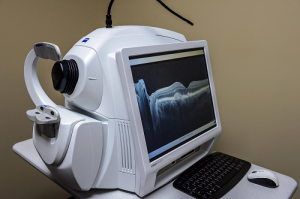MACULAR DEGENERATION
 AGE RELATED MACULAR DEGENERATION (AMD)
AGE RELATED MACULAR DEGENERATION (AMD)
AMD is a common retinal condition that affects people over the age of 50. In the US, this disease is the leading cause of vision loss in older adults. It is a disease that affects primarily the macula and can cause loss of central or reading vision.
The disease progresses at a different rate in each person and affects both eyes. The vision loss associated with this condition can make it difficult to recognize faces, drive a car, read, and perform close work such as sewing or fine hobby work. This disease rarely leads to total blindness. Most people maintain their peripheral vision.
There are two types: dry and wet macular degeneration.
The dry for is more common and has three stages: early, intermediate and advanced. Patients with intermediate and advanced should take an AREDS vitamin. The back layer, the RPE or retinal pigment epithelium, slowly disappears. As these support cells disappear, the overlying photoreceptors disappear. Visual acuity and color vision diminish slowly.
The wet form is considered advanced AMD. Abnormal new blood vessels grow under the back layer of the macula like a weed in the crack of a sidewalk. These abnormal blood vessels leak blood and fluid. Damage can happen quickly. Diminished vision, distortion, and blind spots are common. All patients with wet AMD started off with the dry form.
Risk Factors for AMD include: smoking, race, and family history. Smokers have a two fold higher risk. Patients of Caucasian ancestry are more likely to develop this condition.
ABC’S OF AMD INCLUDE:
- AREDS vitamin
- Blood pressure and cholesterol control
- Check the Amsler grid daily
- Don’t smoke
- Exercise
- Follow up with your eye doctor
- Green leafy vegetables and fish
AGE RELATED EYE DISEASE STUDY (AREDS)
The National Eye Institute found that patients taking high doses of antioxidants and zinc could reduce their risk of developing advanced AMD and experiencing severe vision loss. The findings were based on a ten-year clinical trial called the Age-Related Eye Disease Study (AREDS).
Treatments for the wet form include:
- Intravitreal Injections
- Photodynamic Therapy
- Laser therapy

